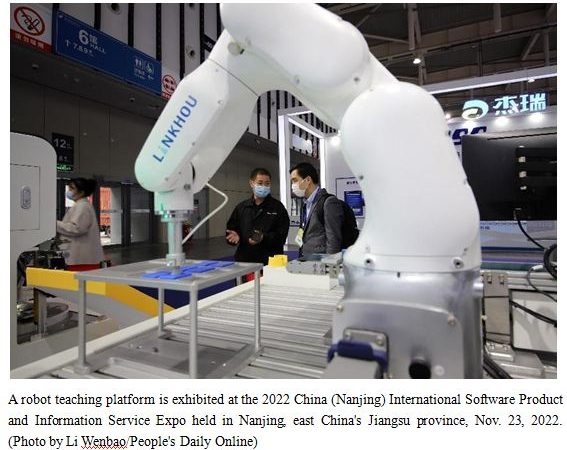China’s eastern city builds better environment for software industry

By Yao Xueqing, People’s Daily
At 10:00 am, a new demand popped up on freight dispatching platform Yunmanman, asking to send a batch of auto parts to Horgos, northwest China’s Xinjiang Uygur autonomous region from Yuhuatai district in Nanjing, capital of east China’s Jiangsu province.
In less than two minutes, the order was taken, and relevant information was simultaneously sent to the truck driver.
“The scheduling system for car-hailing services works to find available drivers near passengers, but that for freight services must rely on big data and cloud computing to match the demand and supply sides in a more targeted manner. It acts intelligently in a wider geographical range,” said Wang Dong, chief technological officer of Yunmanman.
Wang took the Jiangsu-Xinjiang order as an example. After the platform received the consignor’s demand, it checked the length, load capacity, compartment type and other information of trucks available at that time to see whether they were capable of shipping auto parts. It then made matching and recommendations based on truck drivers’ experiences and the consignor’s preference.
Thanks to the application of big data, cloud computing, artificial intelligence and other technologies, it takes just minutes to match a truck driver with a consignor on Yunmanman.
As a homegrown firm in Nanjing, Yunmanman has extended its services to more than 300 cities and connected over 100,000 logistics routes. By reducing empty miles of trucks, the platform makes the logistics industry more efficient and cuts energy consumption and carbon emission, gaining both economic and social benefits.
Benefiting from sci-tech innovation funds, office rental assistance and other favorable policies, Yunmanman has attracted more talents and upgraded its technologies, Wang told People’s Daily.
This year, the R&D team of the firm, making innovations in both business models and technological development, has realized minute-level matchmaking. It has improved the informatization and efficiency of the freight logistics sector and lowered the sector’s general cost and rate of empty miles, Wang added.
“Software and information technology services is a main battlefield for the innovation of a new generation of information technologies, as well as a core engine driving digital economy,” said an official with Nanjing’s municipal bureau of industry and information technology.
As a renowned hub of the software industry, Nanjing is part of a national-level advanced manufacturing cluster for software and information technology services, witnessing robust growth in the industry, the official added. In the first quarter of this year, the revenue of software businesses in the city grew 13.6 percent to 175.84 billion yuan ($24.31 billion).
Currently, leading enterprises are driving the development of the whole industrial chain in Nanjing, which helps expand the coverage of application fields and enhance the cluster effect, the official said.
Recently, an automobile manufacturer in Jiangning district of Nanjing kicked off digital transformation by introducing a digital platform that helps promote interdisciplinary research and development from Nanjing-based software company Glaway Soft.
“As industries develop, intelligent upgrading and digital transformation remains an important way for enterprises to boost high-quality development,” said general manager Yu Dingfang of Glaway Soft.
According to him, with the help of a series of policies, the company has developed some 20 industrial software products that cover the full life cycle of products to mobilize small- and medium-sized enterprises to achieve digital, auto, and intelligent upgrading.
Nanjing has rolled off a series of supporting policies to build a better environment for the development of the software industry. So far, the market of the industry has reached 740.8 billion yuan in Nanjing, or 56.3 percent of Jiangsu province’s total.
The city is now home to about 4,000 major software enterprises and has built a cluster with national-level industrial parks as the core and supported by provincial-level software parks.
Related News

China offers support for Somalia
DNA BEIJING: China’s foreign minister said Beijing supported Somalia in safeguarding its sovereignty and territorialRead More

Pakistan-China friendship exhibition cements cultural ties
Representing the Embassy of the People’s Republic of China, Mr. Wang Shengjie, Head of theRead More


Comments are Closed